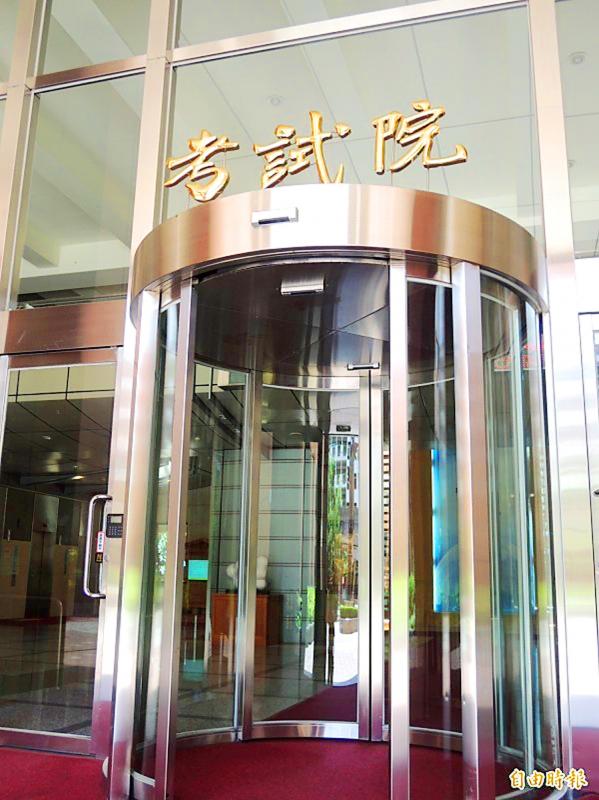Amid calls for its abolition, the Examination Yuan yesterday issued a statement urging people to respect its constitutionally ordained right to independently oversee the national examinations of civil servants — but the move drew flak from several incumbent and newly appointed members.
The Examination Yuan is now headed by Wu Chin-lin (伍錦霖) of the Chinese Nationalist Party (KMT), while Huang Jong-tsun (黃榮村), the newly appointed Examination Yuan president and a former minister of education, is to assume office, along with other newly appointed members, on Sept. 1 for the next four years.
Many lawmakers across party lines have renewed their calls to abolish the Examination Yuan and the Control Yuan — two of the five branches of government — when the Presidential Office nominated new members for the two bodies.

Photo: Yang Mien-chieh, Taipei Times
During the Legislative Yuan’s review last month of nominees for the Examination Yuan, Huang said that he was prepared to be its last president.
Abolishing the Examination Yuan, or attempting to undermine the independence of the power of examination, will result in officials being appointed not because of ability, but because of personal preferences, trampling on the rights of the disadvantaged, setting back government efficiency and damaging administrative neutrality, the Examination Yuan said in a statement.
Since the first examination was conducted in 1950, national exams have been held as the standard for the recruitment of civil servants, evidence that the public agrees with Article 85 of the Constitution, which states: “The selection of civil servants should be based on the results of open competition via an examination system,” it said.
The policy of selecting talent via public examinations guarantees the rights of the disadvantaged and allows ease of transition for people from different social strata, it said.
The Examination Yuan’s efforts to ensure fair competition for civil servant positions have resulted in the abolition of laws and regulations that would otherwise allow people to become civil servants without passing the examinations, it said.
Allowing government agencies to simultaneously hire contract-based employees and those who passed national examinations would not only push personnel costs beyond the currently projected 8 percent, but also severely dampen morale for those who took and passed the national exams, it said.
Should the Examination Yuan be abolished and the Executive Yuan insist that it has control over all executive matters — including the right to appoint officials — it would undermine guarantees of non-partisanship for civil servants as stipulated in Article 18 of the Constitution and sow the seeds of doubt among the public regarding government neutrality, the statement read.
However, a statement issued later yesterday by incoming Examination Yuan vice president Chou Hung-hsien (周弘憲), two incumbent members — Yang Ya-hui (楊雅惠) and Chen Tzu-yang (陳慈陽) — and other officials said that the Examination Yuan should respect the Legislative Yuan and public opinion.
Examination Yuan members should state their own opinions as individuals, instead of issing a collective statement under the agency’s name, they said.
As to whether the government should be composed of three or five branches, the Legislative Yuan has the right to propose constitutional amendments, they added.
The argument for the independence of the power of examination is weak, as Taiwan is the only democratic nation in the world that has a five-branch system of government, they said.
Additional reporting by CNA

A preclearance service to facilitate entry for people traveling to select airports in Japan would be available from Thursday next week to Feb. 25 at Taiwan Taoyuan International Airport, Taoyuan International Airport Corp (TIAC) said on Tuesday. The service was first made available to Taiwanese travelers throughout the winter vacation of 2024 and during the Lunar New Year holiday. In addition to flights to the Japanese cities of Hakodate, Asahikawa, Akita, Sendai, Niigata, Okayama, Takamatsu, Kumamoto and Kagoshima, the service would be available to travelers to Kobe and Oita. The service can be accessed by passengers of 15 flight routes operated by

MORE FALL: An investigation into one of Xi’s key cronies, part of a broader ‘anti-corruption’ drive, indicates that he might have a deep distrust in the military, an expert said China’s latest military purge underscores systemic risks in its shift from collective leadership to sole rule under Chinese President Xi Jinping (習近平), and could disrupt its chain of command and military capabilities, a national security official said yesterday. If decisionmaking within the Chinese Communist Party has become “irrational” under one-man rule, the Taiwan Strait and the regional situation must be approached with extreme caution, given unforeseen risks, they added. The anonymous official made the remarks as China’s Central Military Commission Vice Chairman Zhang Youxia (張又俠) and Joint Staff Department Chief of Staff Liu Zhenli (劉振立) were reportedly being investigated for suspected “serious

Taiwanese and US defense groups are collaborating to introduce deployable, semi-autonomous manufacturing systems for drones and components in a boost to the nation’s supply chain resilience. Taiwan’s G-Tech Optroelectronics Corp subsidiary GTOC and the US’ Aerkomm Inc on Friday announced an agreement with fellow US-based Firestorm Lab to adopt the latter’s xCell, a technology featuring 3D printers fitted in 6.1m container units. The systems enable aerial platforms and parts to be produced in high volumes from dispersed nodes capable of rapid redeployment, to minimize the risk of enemy strikes and to meet field requirements, they said. Firestorm chief technology officer Ian Muceus said

Alain Robert, known as the "French Spider-Man," praised Alex Honnold as exceptionally well-prepared after the US climber completed a free solo ascent of Taipei 101 yesterday. Robert said Honnold's ascent of the 508m-tall skyscraper in just more than one-and-a-half hours without using safety ropes or equipment was a remarkable achievement. "This is my life," he said in an interview conducted in French, adding that he liked the feeling of being "on the edge of danger." The 63-year-old Frenchman climbed Taipei 101 using ropes in December 2004, taking about four hours to reach the top. On a one-to-10 scale of difficulty, Robert said Taipei 101